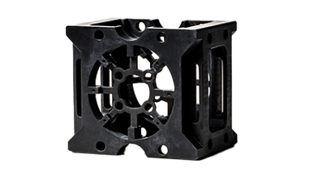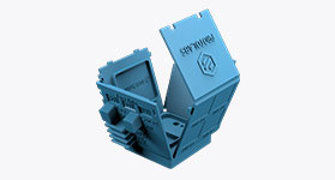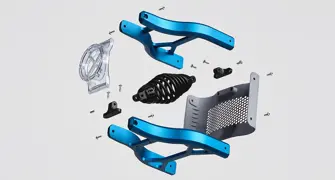When managing your company’s supply chain, it’s a jungle out there. Survival in the jungle depends on meeting your customers’ ever-shifting demands. Indeed, over the life span of many products, demand can be hard to predict, surging and declining at unexpected times. The good news is, you can tame the wild beast of demand volatility with the help of a digital manufacturing supplier.

On-Demand Production Creates Efficiencies, Reduces Costs
Streamline your supply chain, starting with procuring parts on demand, without minimum order quantities (MOQs), by using a digital manufacturing supplier. This concept of manufacturing on demand helps companies manage market volatility, so they’re not tied to massive production forecasts. When demand spikes, they can get parts quickly, avoiding the risk of lost sales opportunities because of stock outages or long lead times. Along these lines, on-demand sourcing also lowers overall inventory cost and warehousing expenses for companies. Finding a contract manufacturer that can incorporate this on-demand capability into your supply chain, will enable your company to create a supply chain that is truly driven by customer demand, not by (and dependent on) a supplier’s lead time.
Indeed, on-demand manufacturing represents an evolution in procurement and supply chain management thought, bringing together the best of previous concepts such as just-in-time manufacturing, which focuses on streamlining operations, and lean manufacturing principles, which seeks to drive waste from processes. With product life cycles getting shorter and industry trends driving mass customization of products, on-demand manufacturing makes even more sense in today’s supply chain strategy.
Consolidating Suppliers Helps
A unique advantage of a digital supply chain is the ability for companies to continue using the same supplier as a part or product moves from prototyping into low-volume production. Consolidating suppliers in this way reduces the cost and complexity of working with multiple vendors. An on-demand manufacturer with the scale, endless capacity, and advanced automation needed to ramp up production quickly to meet delivery dates consistently will improve on-time performance, a key metric in supply chain management.
Mass Customization Requires Low-Volume, High-Mix Supply Chain
An ever-changing marketplace also adds to that demand volatility puzzle. A case in point: Mass production these days is giving way to mass customization and product personalization, especially for user-centric products such as small electronics like smartphones and tablets. These types of market demands are moving manufacturing to become more reactive. Digital suppliers can help meet this challenge, as companies turn to them for a low-volume, high-mix ratio of production on an on-demand basis.
Two industries that are taking advantage of the benefits of digital supply chains are aerospace and medical/health care.

How Aerospace Mitigates Risk
At Protolabs, we work with a number of aerospace companies. As an on-demand digital manufacturer, we automate the front end of the manufacturing process, which helps reduce risk and deliver quality parts on time. Protolabs is looked to as an end-to-end supplier for a number of aircraft and rocket companies. Shorter manufacturing turnaround times, and the ability to support multiple design iterations, helps ensure that the large OEMs, which are taking the risk, are mitigating that risk to the best of their ability pre-flight. Protolabs’ ability to deliver CNC-machined parts in as little as one day, and additive-manufactured (3D-printed) parts in a week or less (depending on the 3DP process), make it an appealing solution to many aerospace engineering and supply chain teams.
Medtech Outsourcing On Demand
In business today, it has become an on-demand consumer economy, and it’s really no different in manufacturing’s business-to-business economy. Medtech and medical device companies are good examples.
As Annie Cashman, Protolabs’ global segment manager for medical sales at Protolabs, pointed out in a recent blog post, “Amazon Prime delivers speed, dependability, and quality to consumers. This concept is the same in medical manufacturing. Product developers and engineers need to deliver on their timelines.” Cashman recalled a story from a previous company she worked for that needed to outsource injection molding and machining prototype parts for a project. The company found help from Protolabs, getting parts in less than a week and even iterating those parts two additional times before showing them to the customer.
In another medtech example, Parker Hannifin recently turned to Protolabs for molding, 3D printing, and machining prototype parts, end-use production components, and even liquid silicone rubber tooling to bridge a production gap.
Ultimately, as premised at the beginning, digital supply chains can tame the wild beast of demand volatility—and in all kinds of industries, too: aerospace, medical/health care, automotive, marine, electronics, consumer products, industrial equipment, and more.






